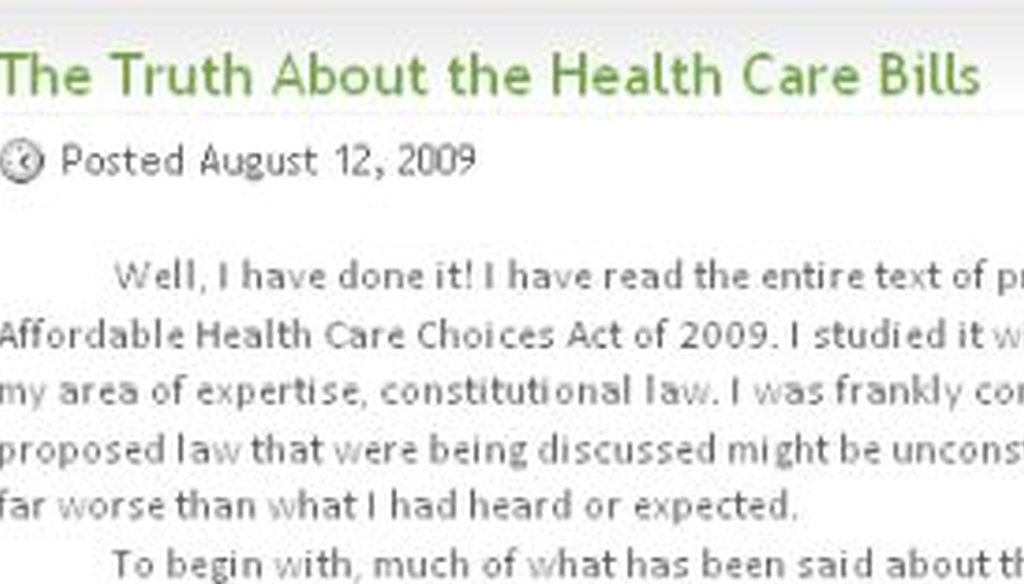Stand up for the facts!
Our only agenda is to publish the truth so you can be an informed participant in democracy.
We need your help.
I would like to contribute

A chain e-mail on the health care bill doesn't quite live up to its billing.
Michael Connelly's chain e-mail story begins like so many others.
The former attorney wrote an e-mail in August blasting the Democratic health care plan as unconstitutional.
"I sent it out to a few friends and relatives," he said, "and it exploded."
Connelly now finds himself averaging one radio interview per day. He started a blog on which he posted the e-mail and a half dozen updates, and it has already gotten 137,000 hits. He's gotten hundreds of e-mails from all over the world.
"It's become almost overwhelming," he said.
In the unusual democracy of e-mail forwarding, you can never predict why some chain e-mails take off and others do not. In this case, we suspect it's because Connelly's carried an air of authority.
The ones we received came with this subject line: "Constitutional lawyer has read the entire proposed healthcare bill."
And this is the first paragraph: "Well, I have done it! I have read the entire text of proposed House Bill 3200: The Affordable Health Care Choices Act of 2009. I studied it with particular emphasis from my area of expertise, constitutional law. I was frankly concerned that parts of the proposed law that were being discussed might be unconstitutional. What I found was far worse than what I had heard or expected."
He wrote the e-mail in August. In fact, the bill Connelly references -- which was the House version of the bill in play when Connelly wrote his e-mail -- is not even the bill that ultimately passed the House. Many of his claims are the same ones being made by other opponents that we've addressed in prior Truth-O-Meter items. But PolitiFact readers kept sending us his and asking us to fact-check it. Clearly this is an e-mail with staying power.
And so we decided to weigh in.
The main topic of the e-mail is the argument that the Democratic health care plans are unconstitutional.
"The irony is that the Congress doesn't have any authority to legislate in most of those areas to begin with!" Connelly wrote. "I defy anyone to read the text of the U.S. Constitution and find any authority granted to the members of Congress to regulate health care."
And more specifically, Connelly contends that the plan to impose tax penalties on those who refuse to purchase insurance violates the 5th Amendment's guarantees of due process.
"If you decide not to have healthcare insurance, or if you have private insurance that is not deemed acceptable to the Health Choices Administrator appointed by Obama, there will be a tax imposed on you," he wrote. "It is called a tax instead of a fine because of the intent to avoid application of the due process clause of the 5th Amendment. However, that doesn't work because since there is nothing in the law that allows you to contest or appeal the imposition of the tax, it is definitely depriving someone of property without the due process of law."
Connelly isn't alone in this opinion.
Constitutional issues raised by Connelly were echoed in an opinion piece for the Wall Street Journal on Sept. 18, 2009, written by David B. Rivkin Jr. and Lee A. Casey, Washington D.C.-based attorneys who served in the Department of Justice during the Ronald Reagan and George H.W. Bush administrations.
And on Jan. 19, Florida Attorney General Bill McCollum said if the current health care bills passed, he would sue to block it on the constitutional grounds.
"Congress's unprecedented mandate on every citizen to purchase health insurance coverage or to face a penalty raises serious constitutional concerns," McCollum said in a statement.
The version of the bill passed by the Senate would impose a tax penalty of $750 by 2016 for those who do not buy health insurance. Under the House bill, people who refuse to purchase health insurance will be hit with a tax penalty equivalent to 2.5 percent of their adjusted gross income.
"A citizen's choice not to buy health insurance cannot rationally be construed as economic activity, or even 'activity,' to subject that inactivity to regulation under the Commerce Clause," a review by McCollum's office concluded.
McCollum said he had spoken with other state attorneys general and that a lawsuit against the legislation would be joined by other states, including Democratic attorneys general.
So there is a school of thought that the bill is unconstitutional. But others dismiss these arguments as unfounded.
Akhil Reed Amar, a law professor at Yale University and author of America's Constitution: A Biography wrote an opinion piece for the Los Angeles Times in which he laid out a detailed explanation of why the health care reform bills would be constitutional.
Essentially, Amar argues that "under the interstate commerce clause of Article I, activities whose effects are confined within a given state are to be regulated by that state government, or simply left unregulated. But the federal government is specifically empowered to address matters that have significant spillover effects across state lines or international borders."
Health care clearly fits the bill, he said.
As for taxing people who refuse to purchase health care, Amar writes, "The longest section of the Constitution's longest article -- Article I, Section 8, to be precise -- opens with the following words: 'The Congress shall have power to lay and collect taxes, duties, imposts and excises.' During the Progressive era, Americans amended the Constitution to underscore the broad power of Congress to tax, and indeed to tax for redistributive purposes. This is the plain meaning and original intent of the 16th Amendment."
At the end of the day, though, all of these arguments are opinions, and if passed the issue would like have to be decided by the Supreme Court. So we can't rate them on the Truth-O-Meter.
But there were several other claims in the e-mail that can be put to the meter.
We took a look at Connelly's claim that the bill would provide "free health care for illegal immigrants." This has been a complaint of many Republican opponents of the health care plans in Congress. It's what prompted South Carolina Republican Rep. Joe Wilson to shout "You lie!" at the president. We concluded that while an argument can be made that there are not sufficient verification procedures to ensure illegal immigrants don't buy health insurance on a government exchange, Connelly's statement was belied by language in the bill that specifically precludes illegal immigrants from getting federal health subsidies. We ruled his statement False.
We also explored Connelly's claim that HR 3200 provides for "free abortion services, and probably forced participation in abortions by members of the medical profession." Since Connelly wrote his e-mail, the abortion language in the House bill has changed, rendering Connelly's claim moot. But we concluded that it was wrong when he said it, and to the extent he says his claim now applies to language in the Senate bill, we think he's wrong about that too. And we give him a False.
Connelly also said the law "does provide for rationing of health care," a general claim we have addressed previously.
According to Connelly, "All decisions about personal health care will ultimately be made by federal bureaucrats, and most of them will not be health care professionals. Hospital admissions, payments to physicians, and allocations of necessary medical devices will be strictly controlled by the government."
We asked Connelly to point us toward the parts of the bill that say the government would limit the kinds of services that private insurers could provide. He referred us to Sections 1301 and 1302, both of which deal with setting minimum "essential" levels of service. But they would not restrict the kinds of services private insurers could provide.
"Bottom line," Connelly concluded in our interview, "they (Democrats) want to take control of the entire health care industry." That's another claim we have dealt with in length, most recently when it was levied by Republican House leader John Boehner. We rated that one False.
Our Sources
Michael Connelly's Web site, "The Truth About the Health Care Bills"
HR 3200, "America's Affordable health Choices Act of 2009"
Cornell University Law School, The Constitution of the United States of America
PolitiFact, "Abortion and the Baucus health care bill," by Robert Farley, Sept. 21, 2009
CNS News, "Reid Introduces Senate Health Bill That Mandates Federally Subsidized Abortion," by Terence P. Jeffrey, Nov. 19, 2009
FactCheck.org, "Health Care Overhaul: Constiutional?" by Viveca Novak, Oct. 2, 2009
Fort Myers News-Press, "Florida AG Bill McCollum says health care bill is unconstitutional," by Paul Flemming, Jan. 19, 2010
Los Angeles Times, Opinion: "Constitutional objections to Obamacare don't hold up," by Akhil Reed Amar, Jan. 20, 2010
House Rules Committee Web site, HR 3962
House Energy and Commerce Committee, The Capps Amendment to HR 3200
PolitiFact, "Boehner says Democrats' health care plan would subsidize abortions," by Robert Farley, Aug. 7, 2009
New York Times, "Abortion Was at Heart of Wrangling," by David M. Herszenhorn and jackie Calmes, Nov. 7, 2009
Ed2go.com, Instructor Bio: Michael Connelly
Wall Street Journal, Opinion: "Mandatory Insurance Is Unconstitutional," by David B. Rivkin Jr. and Lee A. Casey, Sept. 18, 2009
Politico, "Health care reform is constitutional," by Erwin Chemerinsky, Oct. 23, 2009
Fox News, "Health Care Bill Could Face String of Legal Challenges," Dec. 22, 2009
Interview with Michael Connelly, Jan. 20, 2010












































